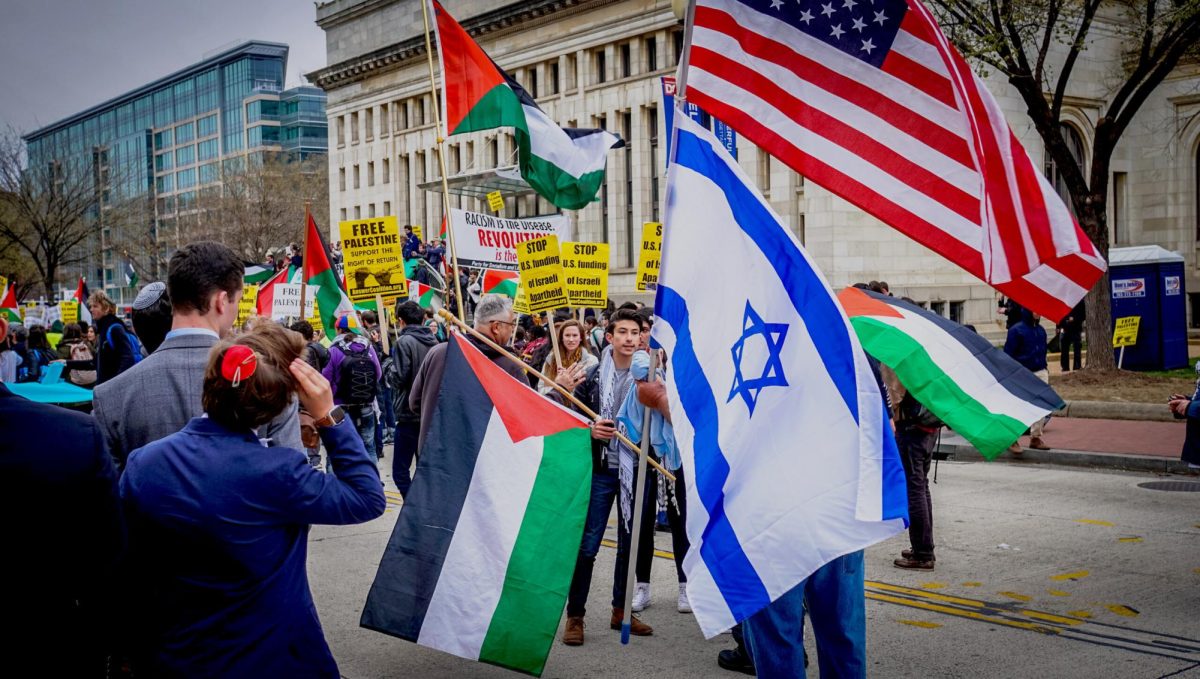From Los Angeles to New York, college students are engaging in pro-Palestinian protests on campuses across the nation, demanding that their schools financially divest from doing business with the state of Israel. With this increase in protests regarding the United States’ involvement in the Israel-Hamas conflict, it is imperative to review the conflict thus far.
For some brief background on the conflict, Israeli and Palestinian tensions have very deep roots with the main dispute centering around who is entitled to the lands between the Jordan River and the Mediterranean Sea. Ever since the establishment of Israel in 1948, these two ethnic groups have been in constant conflict as evident in events such as the Six-Day War (1967), the Munich Olympics Massacre (1972), and the Yom Kippur War (1973).
Since 2007, the Gaza Strip has been ruled by Hamas, a Palestinian militant group and “terrorist organization” that intends to replace Israel with an Islamic state. Hamas has been involved in skirmishes with Israel ever since they assumed control of Gaza, and they launched an attack on Israel on October 7, 2023, killing 1,200 people and holding an additional 250 people as hostages. In response, Israel retaliated through air and artillery strikes, killing over 33,000 Palestinians in Gaza so far. Currently, the two sides still cannot agree on key issues such as the existence of Jewish settlements in the West Bank, the fate of Palestinian refugees, and which territories should be controlled by each ethnic group.
With the conflict currently intensifying and peace looking increasingly unlikely, I decided to meet with Delbarton’s Arabic teacher, Mr. Zack Tabor, in order to gather insight into the future of this conflict and potential resolution.
Before discussing specifics regarding the conflict, Mr. Tabor initially provided three pieces of advice to students in order to help them engage in peaceful and constructive discussions of the conflict. First, he explained that one obviously needs to consider the text, which are the literal words that they are expressing in the conversation. Second, they must consider the context of their statements, examining the historical backdrop surrounding the event, while also paying attention to their physical surroundings and assessing the sensitivity of those around them to the topic. Finally, one must consider the subtext of what they are saying, which people acquire by reading between the lines of statements. While subtext may be easy to pick up on in physical conversations through hand gestures and facial expressions, it may be more difficult to communicate over a written text. Yet, Mr. Tabor also explained that underlying these three elements must be care for everyone in the conversation and an understanding of community values such as the dignity of the human person and solidarity with others, especially the poor and vulnerable.
Initially, given the deep ethnic tensions and competing land-claims between Israel and Hamas, I asked Mr. Tabor whether or not he could potentially see an end in sight to the conflict without the occurrence of genocide or extermination of one ethnic group. At the beginning of his response, Mr. Tabor explained that of the following three statements, only two can be true at once:
- Israel can be a Jewish state
- Israel can have all the land between the river and the sea
- Israel can be a democracy
Mr. Tabor furthered that “the only solution, in my view, that will lead to a lasting and just settlement is a one-state solution, in which all people between the river and the sea have equal rights.” Yet, he qualified that this would still require “decades of civil rights and integration work, with an informative historical allegory being South Africa and their Truth and Reconciliation Commissions.” However, he noted that before this reconciliation process can even begin, the cycles of violence perpetrated by both ethnic groups need to stop, specifically claiming that Israel, as the state actor, must take the first step.
Yet, as a follow-up, I asked how he could potentially envision these two ethnic groups with seemingly irreconcilable differences being able to live alongside each other. In response, he argued that historically, groups with competing viewpoints, such as Black and White people after the American Civil War, were able to resolve their differences and live under one nation. In contrast, Mr. Tabor explained that “the alternative of partitions often leads to more violence in the short and long term, as evident in the partitions of India and Ireland.”
The second question posed to Mr. Tabor revolved around a potential shift in United States-Israel relations. Ever since Israeli Independence following World War II, the United States has given more military and economic aid to them than any other nation, granting them over $260 billion. Ultimately, this aid has continued to increase in the status quo ever since the United States condemned Hamas’s attack on Israel in October. However, recently, the United States abstained from a United Nations Security Council vote and allowed the first successful ceasefire vote to sail through Congress, which many argue is a shift in US foreign policy. Speaking on this issue, Mr. Tabor labeled the action as “posturing” and explained that it was “largely meant to send a message from Biden himself to Netanyahu” to put an end to these casualties. However, Mr. Tabor noted that this was simply “an empty gesture [when] you turn around and… give them the largest aid package you’ve ever given them,” noting that “actions speak louder than words.” Moreover, speaking more generally about US foreign policy, Mr. Tabor declared that in reality, “The United States has never had a coherent foreign policy on the Middle East, as today, we are sending both bombs and food to both sides of the conflict,” which he notes is “damaging to our reputation.”
Finally, after Israel’s attack on the Iranian embassy in Damascus, the following question was presented to Mr. Tabor: What do you foresee happening with this broader conflict with Iran? Initially, Mr. Tabor explained that the cause of this attack was likely because Benjamin Netanyahu, the Israeli prime minister, is actively attempting to expand the war effort to extend his time in office, as an end to the war would likely spell the end to his political career. Regarding the conflict itself, although he notes that neither Israel nor Iran has the military capabilities to invade each other, they certainly can “inflict mass casualties on each other,” which is “destabilizing for the region”. Mr. Tabor warns that “the region is at risk of being caught in one of the largest conflicts ever” because “if Israel was meaningfully attacked and on the verge of losing territory, the United States would be drawn in.”
Evidently, this conflict is a matter of grave concern that could potentially draw major world powers into war; however, given historical allegories of reconciliation in the past, Mr. Tabor hopes that a solution will occur soon and put an end to these mass casualties.
































